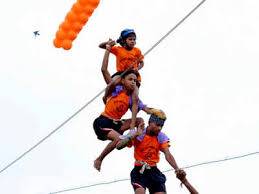 11-09-2019
11-09-2019
58,000 govindas had insurance cover this year, a 30% increase

 Insurance Alertss
Insurance Alertss58,000 govindas had insurance cover this year, a 30% increase

MUMBAI: Days after a 26-year-old govinda from Thane succumbed to injuries sustained during dahi handi celebrations on August 24, the association of mandals stated there has been a steady rise in the number of participants taking insurance cover over the years. The deceased govinda, Dakshak Kelaskar, however, didn’t have a life cover or any insurance to take care of the treatment cost, his family had told TOI.

Dahi Handi Samanvay Samiti (DHSS), a government- recognised umbrella body of govinda mandals in the city, told TOI nearly 58,000 govindas from 1,161 mandals had an insurance cover this year, a near 30% jump as compared to last year.
In 2018, 45,025 govindas were insured by 935 mandals, which was a big jump from 16,963 in 2017. Following a Bombay high court direction to improve safety measures, the DHSS had, in 2018, increased the life insurance cover for govindas to Rs 10lakh from the previous Rs 2lakh.
Kelaskar’s death has put the spotlight back on whether the safety measures are adequate and if mandals are insuring the participants. “The Thane boy’s death is unfortunate, but fact is more mandals have started insuring their team members. Majority of accidents being reported now are from the unregistered mandals,” said Anil Patil, executive president, DHSS. “The sad part is that a spot insurance cover is available for a premium of as little as Rs75 per participant, yet there are groups that don’t buy insurance,” he said. Patil claimed dahi handi has become safer since the high court order on safety measures such as wearing of helmets, knee protectors, chest harness etc.
This year, hospitals across the city reported over 200 injuries. The number is definitely lower than in 2013 when 650 were injured or even 2015 when nearly 364 govindas had to be rushed to hospitals. “The injuries have definitely come down over the years. Previously we used to see over 20-25 fractures and 5-6 spinal injuries, but that number has dropped by over a third. However, lessons should be learnt from cases like Kelaskar’s,” said Dr Arvind Goregaonkar, head of orthopaedics, Sion Hospital.
Source: The Times of India